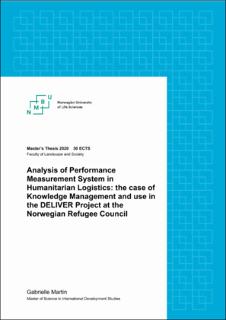| dc.description.abstract | As the need for disaster relief continues to grow globally, humanitarian organisations (HO) are under increasing pressure to deliver assistance in a fast and efficient manner. Humanitarian logistics (HL) is at the heart of HO’s relief work and underpins their success in delivering basic resource and services to those in special need or difficulty. Although HL plays a central role in achieving cost-effective and efficient humanitarian assistance, HOs have yet to recognize this role and successfully measure their performances. One of the reasons is due to their inability to capture consistent and reliable data from field operations. A well-designed performance measurement systems (PMS) can assist HOs in gathering information to improve efficiency, effectiveness, and that could ultimately guide their decision-making.
This thesis is a case study that aims to examine the implementation of a PMS at the Norwegian Refugee Council (NRC) in Oslo. By focusing on a specific project named DELIVER, that is designed to improve PMS at NRC, this thesis analyse and determine if the information gathered from the project was used in a way that improved efficiency and effectiveness of logistic operations. The qualitative research is based on semi-structured interviews with ten logisticians from different NRC global, regional, and country level offices. Secondary data from peer-reviewed literature on HL, PMS, and NRC documentation was used to compliment the interviews. I use a knowledge management framework in order to analyze and evaluate how successful the PMS was in improving NRC’s logistics unit’s performance. The findings show that there were improvements in efficiency and effectiveness of NRC’s logistics after the implementation of DELIVER. However, NRC is still lagging behind on bringing more recognition to its logistics unit, and DELIVER has not yet completely bridged that gap | en_US |

